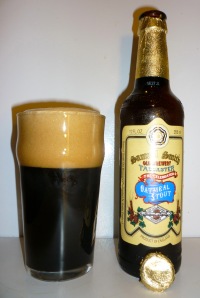i did not dump the first batch right out the the fermentor i bottled it and left it in bottles for a month before i tried it again, and it was awful. the beer i have in the fermenter right now is a brewers best oatmeal stout. i used bottled spring water, steeped the grains for an hour and then added lme and dme,
i tried to get my 5 gallon pot to a boil on my electric stove, which was impossible, took like 4 hours, finally i put the pot in the middle of two burners on high and got it to a roiling boil at 212 deg.
For your next brew try a partial boil. I do my kits this way all of the time on the kitchen stove. I start with 2.5 gallons of water. This will lower the hop utilization, but I don't think it will be noticeable.
i put the hops that came with it in, and boiled for an hour, put it in an ice bath to get temp down to 70
A partial boil will allow chilling the wort to take less time.
, then added water to take it up to 5 gallons, sat it primary for 1 week
I would recommend at least two to three weeks in the primary. I typically go three weeks. Sediment drops out to clear the beer and a nice compact cake is formed. I primary in 6 gallon glass carboys. I don't use a secondary unless I'm dry hopping or aging for over two months. The extra time in the primary lets the yeast clean up the natural off flavors of the fermentation process.
, fg was at 131, og was 163
Could you clarify your hydrometer readings. I usually write mine as FG 1.013 and OG 1.063. Was your FG 1.031 and OG 1.063?
If FG was 1.031 the pitch rate may have been part of the off flavors. An OG of 1.063 may have needed two 11 gram packs of yeast.
, siphoned into secondary, tasted it tastes off, looks like really muddy water, i am going to leave it in the carboy for about a month and then try it again before bottling, i am going to back to basics with the kit i just bought, brewers best weisen beer hopefully will the propane burner i can control temps better.
hopefully with time the oatmeal stout will get better after i bottle, i will not throw it out
my equiptment is as follows:
5 gallon bucket
5 gallon bottling bucket with spigot
6 gallon carboy
5 gallon stainless steel pot
pbw and starsan for cleaning and sanatizing
i have an electronic thermometer and a regular thermometer
hydrometer
auto siphon and tubing
should be everything i need for extract kits



